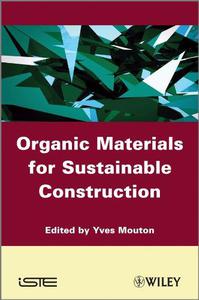
Organic Materials for Sustainable Construction By
2011 | 649 Pages | ISBN: 1848212240 | PDF | 18 MB
This book provides an inventory of organic materials and products, the major components of all civil engineering projects, in terms of their scientific and technical background, including the regulations that cover their use and their predicted useful life. Such materials include: bitumen on the roads; geotextiles for retaining walls; membranes for bridges; tunnel and reservoir waterproofing; paint binders to protect metallic and concrete structures or to realize road markings; injection resins; gluing products; concrete admixtures; and composite materials. The presentation is based on a physicochemical approach, which is essential if these products are to be considered as part of sustainable development: as such, those studying or working in these fields will find this an invaluable source of information.Content: Chapter 1 Organic materials used in Construction at the Dawn of the Third Millennium (pages 1-14): Michel De Longcamp and Yves MoutonChapter 2 Sustainable Development Issues Regarding Organic Materials used in Civil Engineering (pages 15-36): Agnes JullienChapter 3 Health Risks of Organic Materials used in Construction (pages 37-50): Guy AuburtinChapter 4 Ecological Impacts of Organic Construction Materials (pages 51-62): Yves PerrodinChapter 5 Organic Polymers (pages 63-120): Jacques Verdu and Bruno FayolleChapter 6 Formulation of Plastics (pages 121-130): Michel de LongcampChapter 7 Ageing and Durability of Organic Polymers (pages 131-178): Jacques Verdu and Bruno FayolleChapter 8 Fireproofing polymeric materials (pages 179-188): Serge BourbigotChapter 9 Organic Materials, Waste and Recycling (pages 189-202): Vincent VerneyChapter 10 Geosynthetics and Waterproofing (pages 203-268): Philippe MestatChapter 11 Waterproofing Buildings (pages 269-282): Gerard HemondChapter 12 Elastomers and Rubbers used in Civil Engineering (pages 283-312): Michel FragnetChapter 13 Composite Materials and Construction (pages 313-338): Jean?Francois CaronChapter 14 Textile Materials (pages 339-352): Bernard Maurin and Romain FerrariChapter 15 Wood (pages 353-388): Remy MouterdeChapter 16 Bitumen, Road Construction and Sustainable Development (pages 389-406): Bernard LombardiChapter 17 Industrial Mortars and Repairing Concrete Products (pages 407-418): Pierre Boulanger and Paulo GoncaloChapter 18 Waterborne Paints to Limit VOC Emissions (pages 419-430): Emmanuel Aragon and Andre MargaillanChapter 19 Rheological Admixtures (pages 431-446): Nicolas RousselChapter 20 Contributions of Organic Admixtures in Construction Processes (pages 447-456): Francois CussighChapter 21 Organic Fibers in Cementitious Materials (pages 457-482): Laetitia D'Aloia?SchwartzentruberChapter 22 Adhesive Bonding, a Method for Construction (pages 483-501): Thierry ChaussadentChapter 23 Strengthening Concrete Structures by Externally Bonded Composite Materials (pages 503-528): Marc QuiertantChapter 24 Durability of FRP Strengthened Concrete Specimens under Accelerated Ageing (pages 529-552): Karim Benzarti, Marc Quiertant, Sylvain Chataigner and Christophe AubagnacChapter 25 Characterization of Organic Materials used in Civil Engineering by Chemical and Physico?chemical Methods (pages 553-582): Fabienne FarcasChapter 26 Organic Materials and Sustainable Architectural Design (pages 583-598): Michel PaulinChapter 27 Specific Contributions of Viscous Behavior Materials in Construction (pages 599-607): Bernard HalphenChapter 28 Organics in Construction - How Far? (pages 609-616): Henri Van DammeChapter 29 Thoughts on the Futurology in Research and Development of Innovative Materials (pages 617-630): Jean Billard
Links are Interchangeable - No Password - Single Extraction



